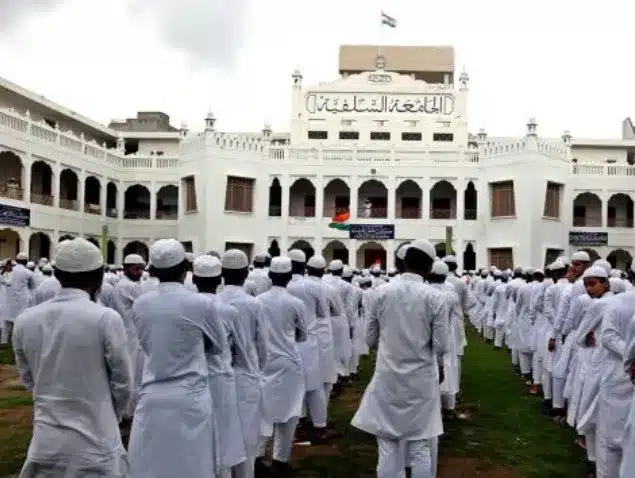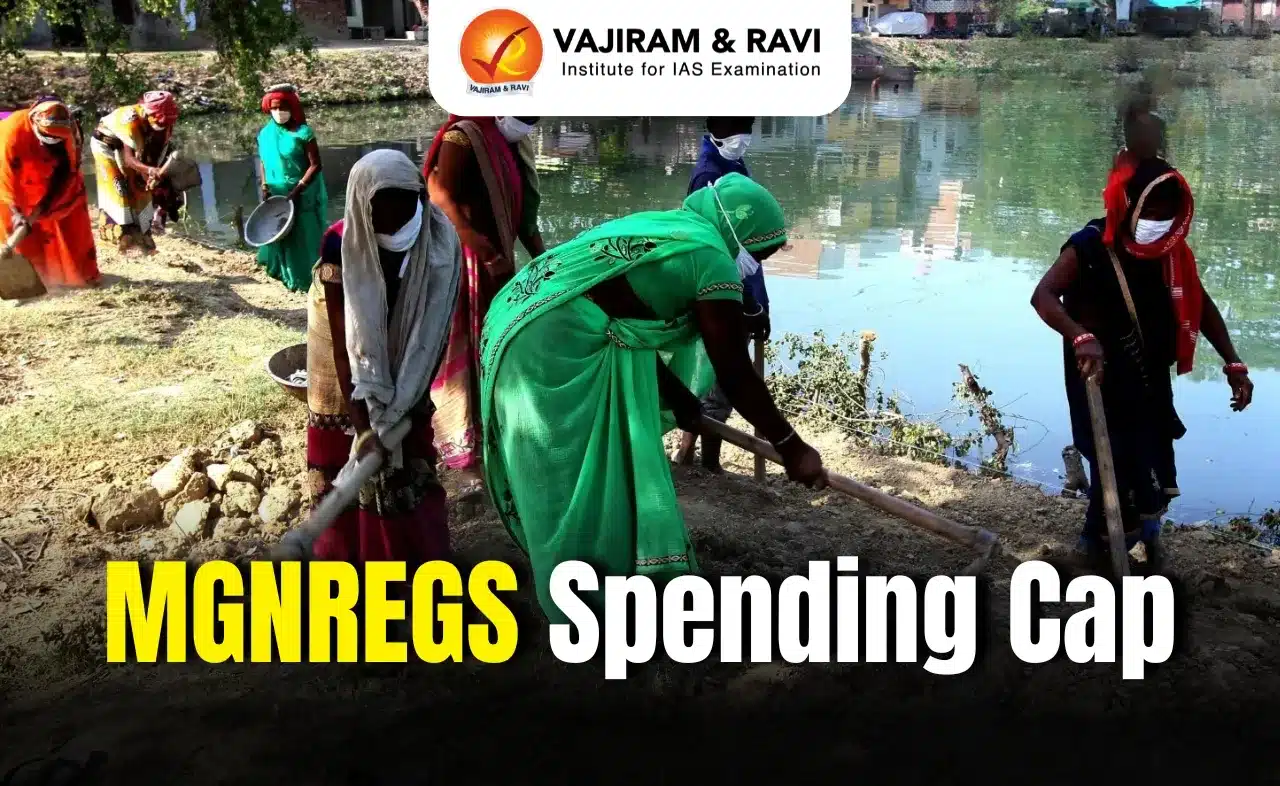What’s in today’s article?
- Why in News?
- 2004 UP Madarsa Act
- Background of the case
- Final verdict by the SC
- Key highlights of the judgement
- Impact of the Supreme Court Decision on the Madarsa Act
Why in News?
The Supreme Court, in a three-judge bench led by Chief Justice D Y Chandrachud, upheld the Constitutional validity of the Uttar Pradesh Board of Madarsa Education Act, 2004. This Act regulates madarsa education in Uttar Pradesh.
Previously, in March, the Allahabad High Court struck down the Act, citing a violation of secularism principles. However, the Supreme Court stayed this High Court ruling in April, allowing the Act to remain effective until the Supreme Court’s final decision.
The recent verdict affirms the law’s legitimacy, emphasizing its compliance with Constitutional standards.
2004 UP Madarsa Act
- Background and Purpose of the Madarsa Act
- The Uttar Pradesh Board of Madarsa Education Act, 2004, establishes a legal framework for madarsa education in Uttar Pradesh.
- This Act enables madarsas to teach both the National Council of Educational Research and Training (NCERT) curriculum and religious studies.
- Madarsa Board
- It also set up the Uttar Pradesh Board of Madarsa Education, primarily comprising members from the Muslim community, to oversee and standardize madarsa education.
- Roles and Functions of the Madarsa Board
- Under Section 9 of the Act, the Board’s responsibilities include designing course material and conducting exams.
- It provides standardized examinations for courses ranging from ‘Maulvi’ (equivalent to Class 10) to ‘Fazil’ (equivalent to a Master’s degree).
Background of the present case
- Legal Challenge to the Act
- A lawyer filed a petition against the Madarsa Act, arguing that it violated several constitutional provisions:
- Article 14: Right to equality before the law
- Article 15: Prohibition of discrimination on religious grounds
- Article 21-A: Right to free and compulsory education for children aged 6 to 14
- The petitioner claimed that the Act did not provide quality compulsory education up to Class 8 or universal access to quality education, as mandated by Article 21-A.
- A lawyer filed a petition against the Madarsa Act, arguing that it violated several constitutional provisions:
- Matter reaches Allhabad HC
- Key Issues Raised Before the Allahabad High Court
- Secularism and the Madarsa Act: Whether the provisions of the Madarsa Act align with secularism.
- Religious Exclusivity in Board Membership: The Act’s requirement for Board members to belong to a specific religion was questioned, with arguments for allowing members from diverse backgrounds with expertise in education, regardless of religion.
- Administration Under the Minority Welfare Department: Whether it was arbitrary to place the Board under the Minority Welfare Department instead of the Education Ministry.
- Access to Educational Expertise and Policies: Whether it was unfair to deny madarsa students access to educational experts and their policies, which could enhance the quality of education provided in madarsas.
- Key Issues Raised Before the Allahabad High Court
- Key highlights of the Judgement by Allahabad HC
- Allahabad High Court declared Madarsa Act to be unconstitutional.
- It directed the State to take steps forthwith for accommodating the Madarsa students in regular schools recognized under various education Boards.
- Matter reached to SC
- In April 2024, the Supreme Court stayed the Allahabad High Court’s judgment, noting that while the state has a valid interest in ensuring quality education for students, the High Court erred in striking down the Madarsa Act.
- The Apex Court observed that the Act was primarily regulatory and did not warrant complete invalidation.
Final Verdict by the SC
- Arguments before SC
- Religious Education vs. Religious Instruction
- The Court explored whether madarsas impart “religious education” (learning about religions) or “religious instruction” (compulsory participation in worship).
- Referring to Ms. Aruna Roy vs Union of India (2002), the Court highlighted that while religious instruction is restricted in state-recognized institutions under Article 28, religious education aimed at promoting communal harmony is permissible.
- Validity of Striking Down the Entire Act
- The Court questioned whether the High Court was justified in invalidating the entire Madarsa Act, rather than targeting specific provisions.
- CJI noted that discarding the entire Act would be extreme, suggesting that the state could enforce rules under the Act to promote a more secular curriculum.
- Religious Education vs. Religious Instruction
- Final verdict by SC
- SC upheld the constitutional validity of the ‘Uttar Pradesh Board of Madarsa Education Act 2004’.
- It set aside the Allahabad High Court’s judgement which had struck it down earlier.
Key highlights of the judgement
- Regulation of Education Standards
- The Madarsa Act provides a regulatory framework to ensure educational standards in madarsas recognized by the Board.
- Alignment with State Obligations
- The Act aligns with the state’s obligation to enable students in recognized madarsas to acquire skills and competencies necessary for social participation and employment.
- Balance with Minority Rights
- The Act must be interpreted alongside Article 21A and the Right to Education Act, respecting religious and linguistic minorities’ rights to manage their educational institutions.
- With state approval, the Board may implement regulations that ensure secular education standards without compromising the institutions’ minority character.
- Legislative Competence and Limits
- While the Madarsa Act falls within the State Legislature’s jurisdiction under Entry 25 of List 3, provisions regulating higher degrees (e.g., fazil and kamil) are unconstitutional as they conflict with the UGC Act, which is governed by Entry 66 of List 1.
Impact of the Supreme Court Decision on the Madarsa Act
- The Supreme Court’s decision will directly impact madarsa education in Uttar Pradesh, with broader implications for religious education nationwide.
- This ruling could influence other religious institutions, such as gurukuls and convent schools, by shaping how secularism principles apply to religious education within state-regulated educational frameworks.
Q.1. What was the Supreme Court’s decision on the Uttar Pradesh Madarsa Education Act?
The Supreme Court upheld the constitutionality of the Uttar Pradesh Board of Madarsa Education Act, 2004, reversing the Allahabad High Court’s ruling. The Act ensures regulatory standards for madarsa education while respecting minority rights and promoting secular education.
Q.2. How does the SC ruling affect religious education across India?
The Supreme Court’s decision reinforces the regulatory framework for madarsa education, which may have broader implications for other religious institutions, including gurukuls and convent schools, by determining how secularism principles apply to religious education within state-regulated educational systems.
News: UP Madarsa Education Act upheld by SC: What was the case? | SCC online | Live Law
Last updated on June, 2025
→ UPSC Notification 2025 was released on 22nd January 2025.
→ UPSC Prelims Result 2025 is out now for the CSE held on 25 May 2025.
→ UPSC Prelims Question Paper 2025 and Unofficial Prelims Answer Key 2025 are available now.
→ UPSC Calendar 2026 is released on 15th May, 2025.
→ The UPSC Vacancy 2025 were released 1129, out of which 979 were for UPSC CSE and remaining 150 are for UPSC IFoS.
→ UPSC Mains 2025 will be conducted on 22nd August 2025.
→ UPSC Prelims 2026 will be conducted on 24th May, 2026 & UPSC Mains 2026 will be conducted on 21st August 2026.
→ The UPSC Selection Process is of 3 stages-Prelims, Mains and Interview.
→ UPSC Result 2024 is released with latest UPSC Marksheet 2024. Check Now!
→ UPSC Toppers List 2024 is released now. Shakti Dubey is UPSC AIR 1 2024 Topper.
→ Also check Best IAS Coaching in Delhi





















